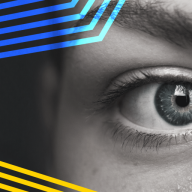This week's best things
Failure stories, FOH & education teams, the National Theatre, a million homepages, AI optimism, museum toolkits, Wikimedia crawlers, knitting, the immersive industry, gov collabs, and a strange Nintendo site.

A shorter newsletter this week because I have been ill for most of the past few days. Here we go...
One week left to share your experiences of digital projects that fell short
The digital failure survey closes on Sunday, 13th April. If you’ve ever worked on a digital project that didn’t quite go to plan, I’d love to hear from you.
The responses so far are building a really clear and honest picture of how the sector approaches digital work and where things tend to go wrong.
The more responses we get, the clearer and better that picture will be.
It’s completely anonymous, takes less than five minutes, and could help identify patterns and challenges that often go unspoken and unaddressed.
Add your experience before the deadline. Thanks in advance.
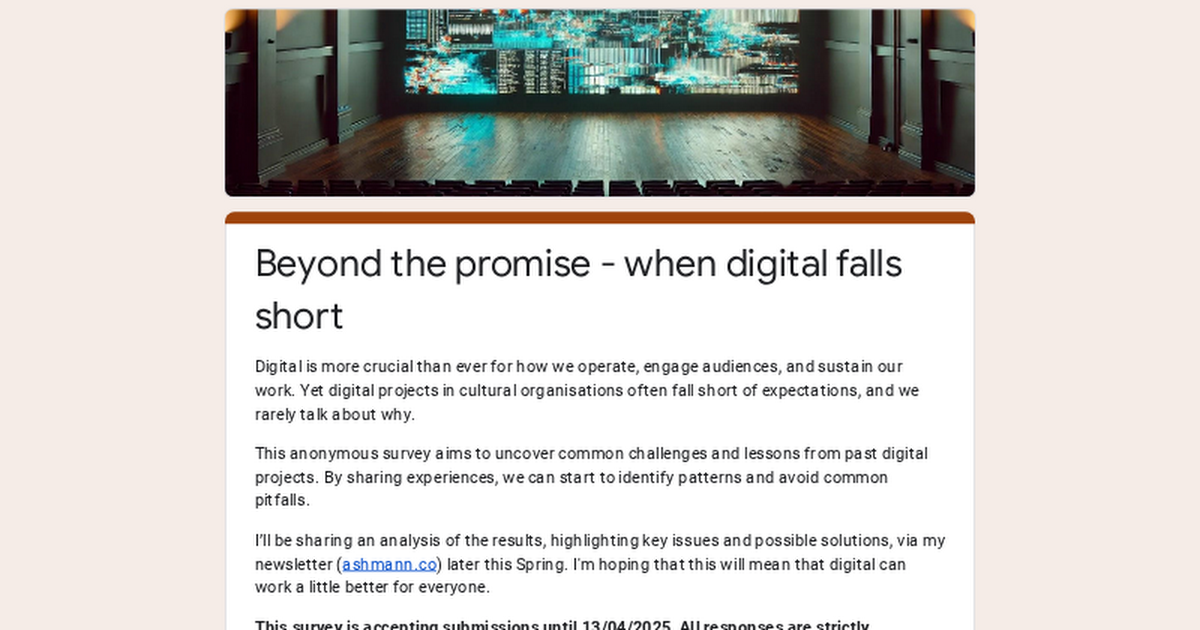
Bringing Museum Front-of-House and Education Together: Seven Key Lessons
One of the lessons that is emerging from the digital failure survey is the value of inter-departmental collaboration.
And that is the subject of this article from MuseumNext which shares the lessons learned from the Front of House and Education teams at New York's Intrepid Sea Air and Space Museum working much more closely together.
"Ultimately, visitors do not distinguish between different teams; they simply expect a welcoming, insightful visit. Whether it’s an operational detail like understanding their ticket or a complex question about artefact provenance, they appreciate a unified approach where every staff member shares in the mission to inform, inspire, and delight."
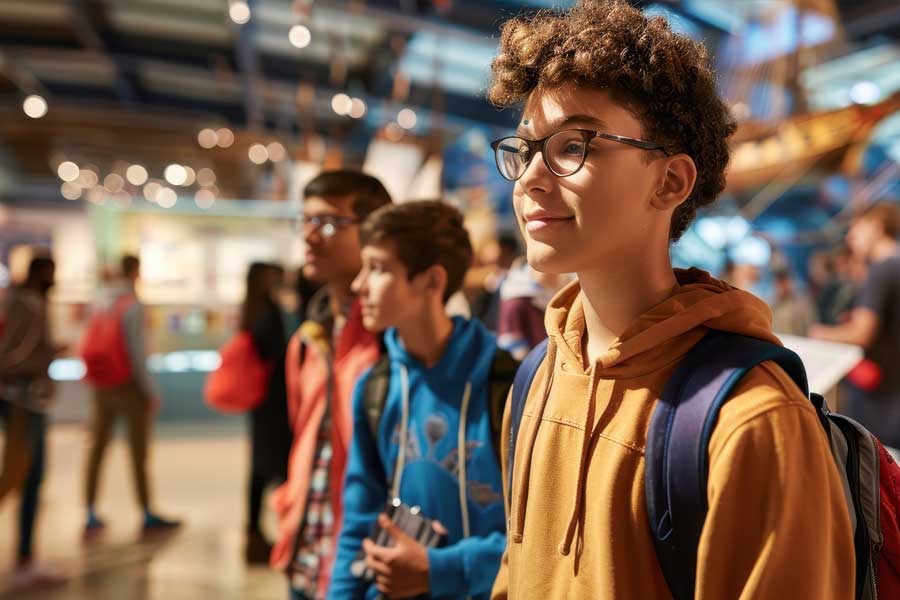
Emma Keith on NT Live, NT At Home, leadership, learning, and experimentation
The latest edition of the Digital Works Podcast is out today, a great chat with the National Theatre's outgoing Managing Director - Digital, Emma Keith.
We talked about how digital practice has developed at the NT and how that differs from other performing arts organisations. The history of the NT Live programme, and the importance of pilots and testing ideas. The hidden value of digital infrastructure, remote audiences, thinking about outcomes rather than outputs, leadership, creating a culture of learning, and loads more.

Digital culture - a review of evidence and experience, with recommendations for UK policy, practice and research
Dr Susan Oman was on a visiting researcher placement at DCMS (Department for Culture, Media and Sport) from 2022-2024. The report she's written - which makes recommendations across a number of areas, is worth a read.
"Digital culture was a problematic term for some interviewees. The word digital holds varied meaning, value and importance across UK cultural sectors and funders. This lack of a shared understanding is a barrier to effective policymaking. Now that digital policy has moved from the remit of DCMS to the new Department for Science, Innovation and Technology (DSIT), this is a good time to review digital possibilities for culture policymaking and to improve understanding of digitalisation efforts, and data on innovations in digital culture"
"Support the development of future policy and digital practice by evaluating ‘what works’ in digital cultural initiatives. Identify current and future needs and opportunities through reflections on what has not worked and encourage and champion ‘best practice’ across the wide diversity of cultural sectors and scales of ambition. Evaluations of current support mechanisms must improve to account for failure or average achievement and reflect on past successful digital support mechanisms."
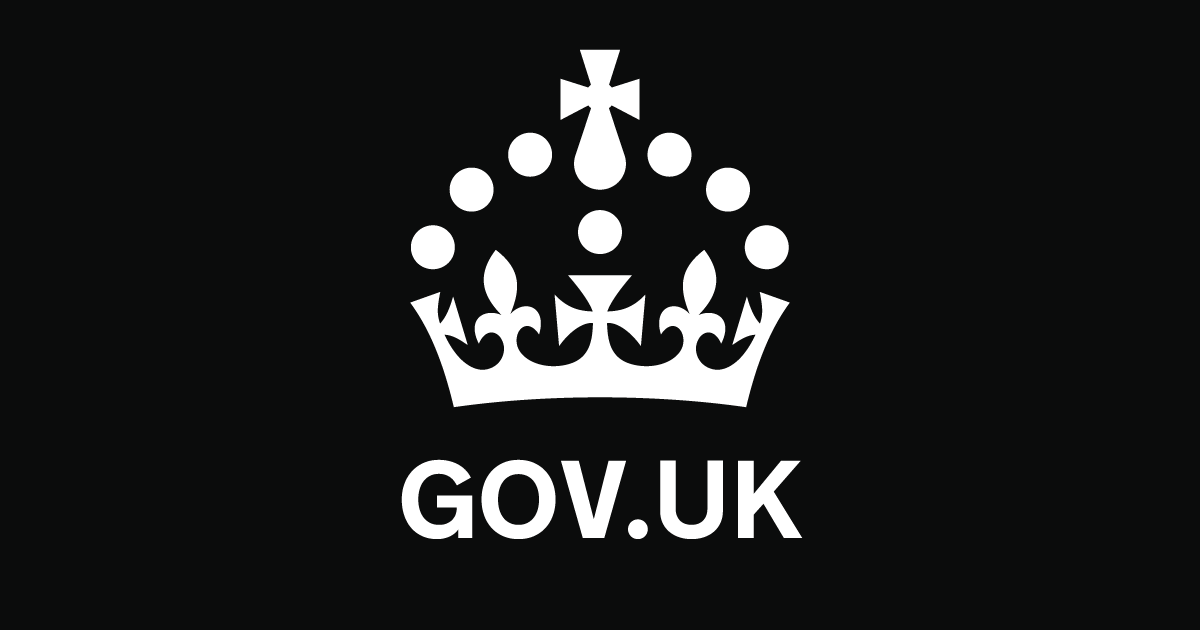
The 2025 report on the accessibility of the top 1,000,000 home pages
It's not great news.
"94.8% of home pages had detected WCAG 2 failures. This improved slightly from 95.9% in 2024. Over the last 6 years, the pages with detectable WCAG failures have decreased by only 3.1% from 97.8%. These are only automatically detected errors that align with WCAG conformance failures with a high level of reliability which suggests that the rate of full WCAG 2 A/AA conformance was certainly lower."

An Open Letter to my Fellow Artists: The Age of AI is the Age of the Artist
On Monday I recorded a podcast conversation with artist and director, Brandon Powers. We talked about a lot of things, including why Brandon thinks that the acceleration of AI and technology in general opens more opportunities and creates more need for artists and creative thinkers.
And in a moment when AI doomerism seems to be everywhere it was nice to think differently and more positively.
After our conversation Brandon pointed me towards this article that he wrote in February.
"I propose that AI will make Artists more valuable than ever before. In fact, I believe it will help the world see how essential we are to the fabric of a healthy democracy and society. You may see lots of AI generated writing, images, video, songs online and completely turned off by them. I get it. There is definitely a lot of slop, especially if you are not interested in viewing this work from the angle of technological innovation.
You may even feel under attack by the hordes of online posters sharing their work. You see things you may consider holding low aesthetic value or soul made with the click of a button. You are not wrong to feel this way. It is a natural response to the fundamental shift we are all experiencing at an extremely rapid pace. I also understand the instant rebuke because of who it seems to be leading much of the AI community: tech bros often cast as the Anti-Artists (now I don’t think that’s actually the case, but that’s for another letter). Many artists distrust AI because it feels like yet another Silicon Valley gold rush, similar to NFTs and the CryptoBro era. The skepticism is understandable. It feels as though there is residual fatigue due to some of the same leaders and loud voices and a renewed distaste for American Tech Leaders. Distrust + existential fear = a very bad combination! But unlike speculative digital assets, AI is a tool, not a product, and how we wield it is still up to us."

AI: A Museum Planning Toolkit
This toolkit was first published, by the Museums & AI Network, in 2020. I hadn't come across it until this week and it contains some useful guidance and case studies of AI experiments in museums that could be useful context and prompts for conversations around AI adoption in your organisation, whether you're a museum or not.
It has worksheets related to AI capabilities, ethics, and stakeholder management, as well as explanations of some of the (many) terms that float around about this topic.
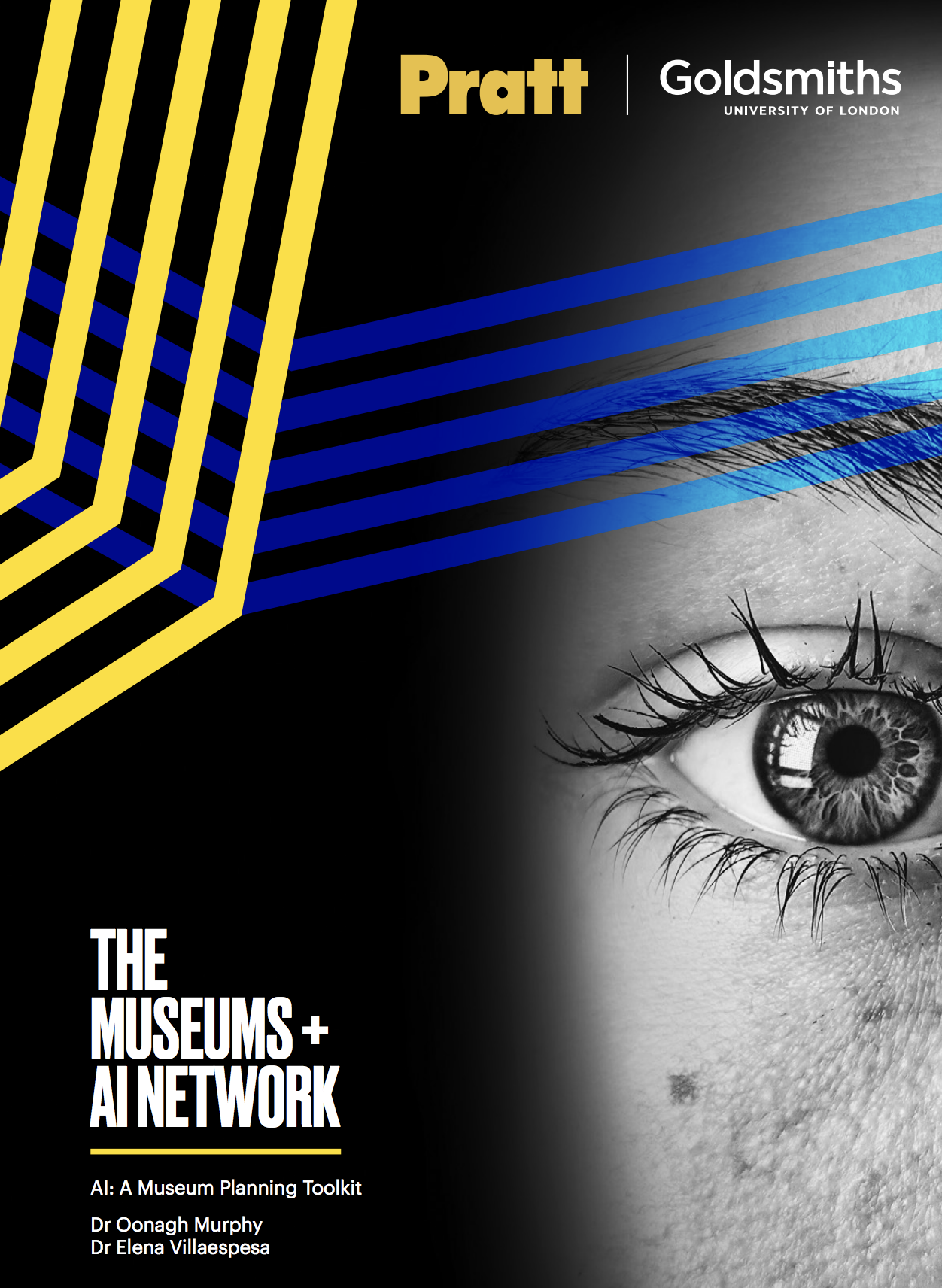
How crawlers impact the operations of the Wikimedia projects
The Wikimedia Foundation (the organisation that runs Wikipedia) published a blog this week which highlighted the surge in traffic that Wikimedia has experienced.
This traffic mostly comes from bots who are scraping the content to train AI models. Since January last year (2024), bandwidth used for multimedia has increased by 50%, mostly due to scraping.
"Our infrastructure is built to sustain sudden traffic spikes from humans during high-interest events, but the amount of traffic generated by scraper bots is unprecedented and presents growing risks and costs. [...]
While human readers tend to focus on specific – often similar – topics, crawler bots tend to “bulk read” larger numbers of pages and visit also the less popular pages. This means these types of requests are more likely to get forwarded to the core datacenter, which makes it much more expensive in terms of consumption of our resources. "

Knitting Through Digital Decay: A Collection of Digital Preservation Jumpers No One Asked For (But Here They Are Anyway)
Want a knitting pattern so you can knit your own floppy disk jumper?
Of course you do.
Leontien Talboom shares her work.
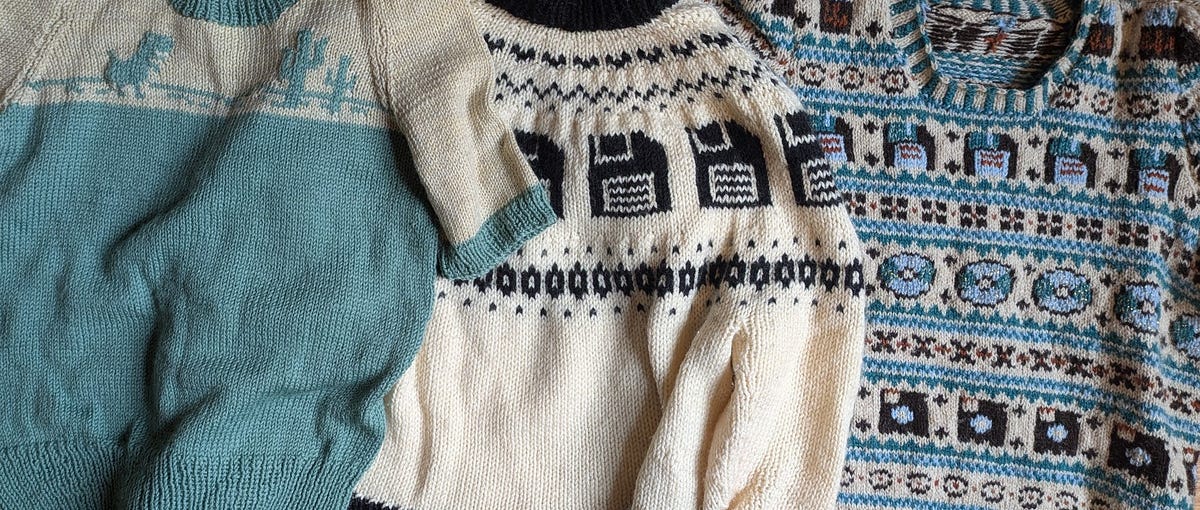
Amazon is ready to launch its Starlink competitor
If you're trying to avoid Elon Musk then here's a Starlink competitor, unfortunately it's from Amazon, and therefore Jeff Bezos, who is only marginally less awful.
"As a global service offering, Amazon’s space internet service will eventually be available from “virtually any location on the planet.” Users will need terminal antennas to tap into the satellite constellation. In 2023, Amazon said that its smallest dish, a seven-inch square design weighing just one pound, would offer speeds up to 100Mbps, making it a Starlink Mini alternative. Amazon will further compete with SpaceX by offering larger dishes for residential and enterprise use offering speeds up to 1Gbps. Amazon expects to produce the terminals “for less than $400 each,” which may or may not be subsidized to attract users."
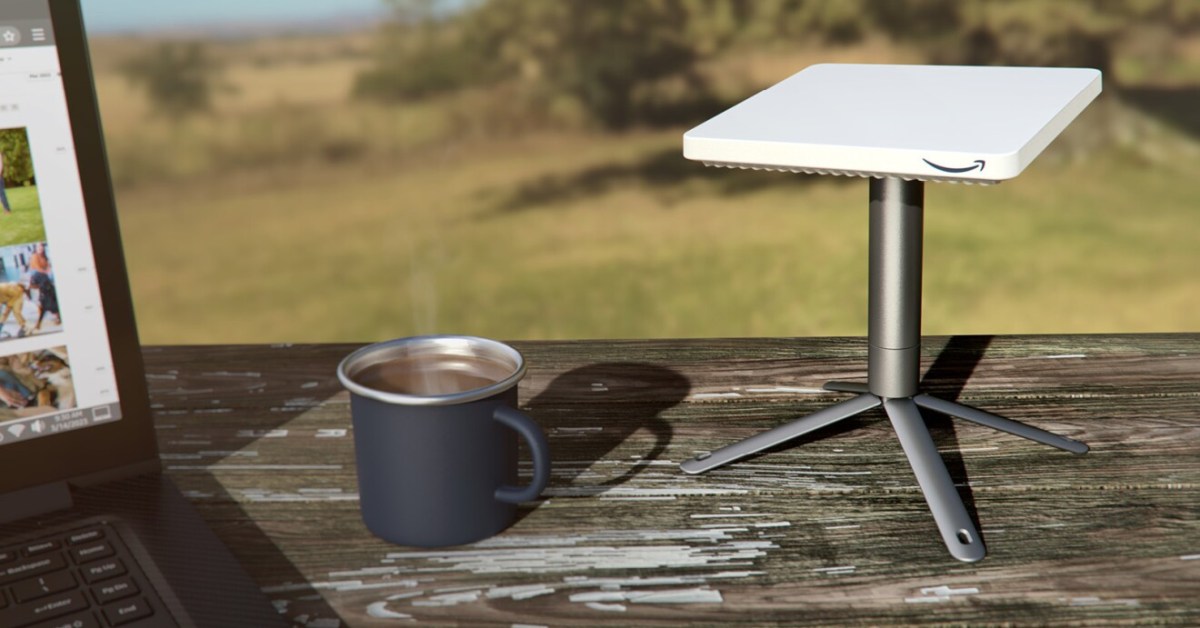
Evolving Immersive: The 2025 immersive industry report
A report into the state of the immersive experience sector in 2025. It contains a number of useful observations.
"The landscape of live event marketing has undergone a seismic shift in recent years, creating unique challenges for immersive experiences trying to connect with potential audiences. While mega- events with established brands (e.g., Netflix, WWE) or celebrity power (e.g., Taylor Swift) continue to thrive, smaller-scale immersive productions often struggle to break through the noise of today's fragmented media environment, especially on small or nonexistent marketing budgets. Over the last fifteen years there has been a fundamental change in how audiences discover and engage with experiences. Organic audience-building is generated from shareworthy experiences on social media, while the fans of entertainment franchises (e.g. Westworld, Squid Game) provide an easy-to- reach fanbase for modern IP-related experiences. However, this kind of organic drive has become increasingly difficult in today’s algorithm-driven social media landscape."
"73% [of respondants] were willing to travel to experiences that piqued their interest; those who traveled frequently also reported a willingness to pay more for immersive experiences (presuming they are high quality)."

Docs
A new collaborative writing product (it looks like a Notion-type thing) has come out of a French-German government collaboration. It'd be interesting to see more of this sort of partnership work.
"Docs offers an intuitive writing experience. Its minimalist interface favors content over layout, while offering the essentials: media import, offline mode and keyboard shortcuts for greater efficiency.
Docs is the result of a joint effort lead by the French (DINUM) and German governments (ZenDiS). We are always looking for new public partners (we are currently onboarding the Netherlands). Feel free to reach out if you are interested in using or contributing to docs."
Currently it looks like it's only available to non-French government users if you self-host it.
Along similar lines (but at a much earlier stage of development) I saw Roomy which is an open source group chat product, similar to Slack or Discord.
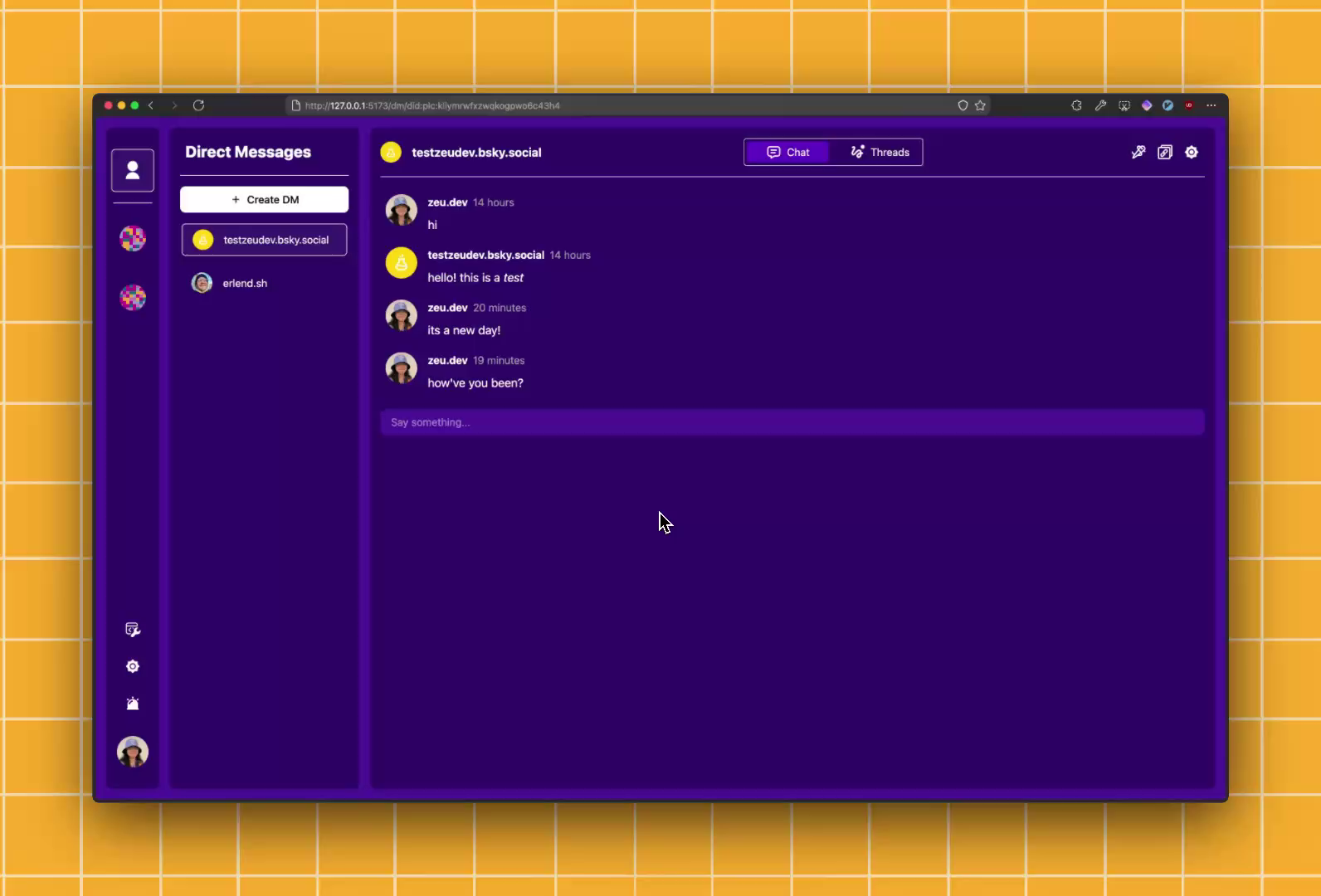
Vacancies
Senior Content Manager - National Gallery - London, UK - £49,709 - deadline 11/04/25
This week's consumption
We watched Adolescence, it was a lot.
I've almost finished the 700 pages of The Covenant of Water by Abraham Verghese which, thus far, has been extraordinarily good, hopefully it sticks the landing.
See you next week
Thanks for reading all the way to the end. Please enjoy this website for the family office of the founder of Nintendo, Fusajiro Yamauchi. Diagonal scrolling, 8-bit music, and lots of other weirdness.
To finish, a quick reminder that I'm a consultant who helps cultural organisations do better digital work - if it sounds like I could be useful, then let's chat.






